
In the wake of the Gen Z protest, Nepal’s international diplomacy remains largely improvised

KATHMANDU: The ministerial chair on the first floor of the Ministry of Foreign Affairs (MoFA) in Singha Durbar has remained unoccupied for two months. The photograph of Arzu Rana Deuba, who served as the Foreign Minister prior to the Gen Z protest on September 8 and 9, has been removed, while Foreign Secretary Amrit Bahadur Rai is overseeing the ministry’s routine administrative affairs. The full burden of the minister’s responsibility rests directly upon Prime Minister Sushila Karki.
Upon entering Foreign Secretary Rai’s office on the afternoon of November 16, I noted the portraits of President Ram Chandra Paudel and Prime Minister Karki displayed on the wall. This visual evidence unequivocally confirms the transition in the country’s executive and ministerial leadership. Nevertheless, the current government, established with the primary mandate to conduct elections, institute good governance, and enforce strict anti-corruption measures, has failed to prioritize the task of making the Ministry of Foreign Affairs’ operations both nimble and impactful. Consequently, the nation’s participation in crucial global diplomatic forums has not only been relegated to the staff level but has also become constrained by interim and ad hoc arrangements.
In reality, the interim government led by former Chief Justice Karki should now be making strong diplomatic efforts to reassure the major power nations and the global community about the suddenly changed political and governance scenario in the country. But, unfortunately, the Karki-led government is more active in making the MoFA and its missions abroad ad hoc and helpless rather than strengthening them to reassure the international community. The impact of this is also beginning to be seen on the world stage, in the country’s international image, and in bilateral relations.
The MoFA is currently without a full-time minister. Eleven embassies in Nepal’s key benefactor and power nations have suddenly become ambassador-less. Although there is still a possibility of a new minister being appointed to the MoFA, there is no sign anywhere of new ambassador appointments to the vacant embassies before the impending election. Senior diplomat and former Ambassador Nilambar Acharya says, “In the new situation, the country needed an independent expert, a sharp, quick, and working foreign minister who understands foreign affairs; there has been a serious lapse in this. Recalling 11 ambassadors at once on a whim, especially when there is no full-time minister, has created a profound vacuum in the country’s international relations.”
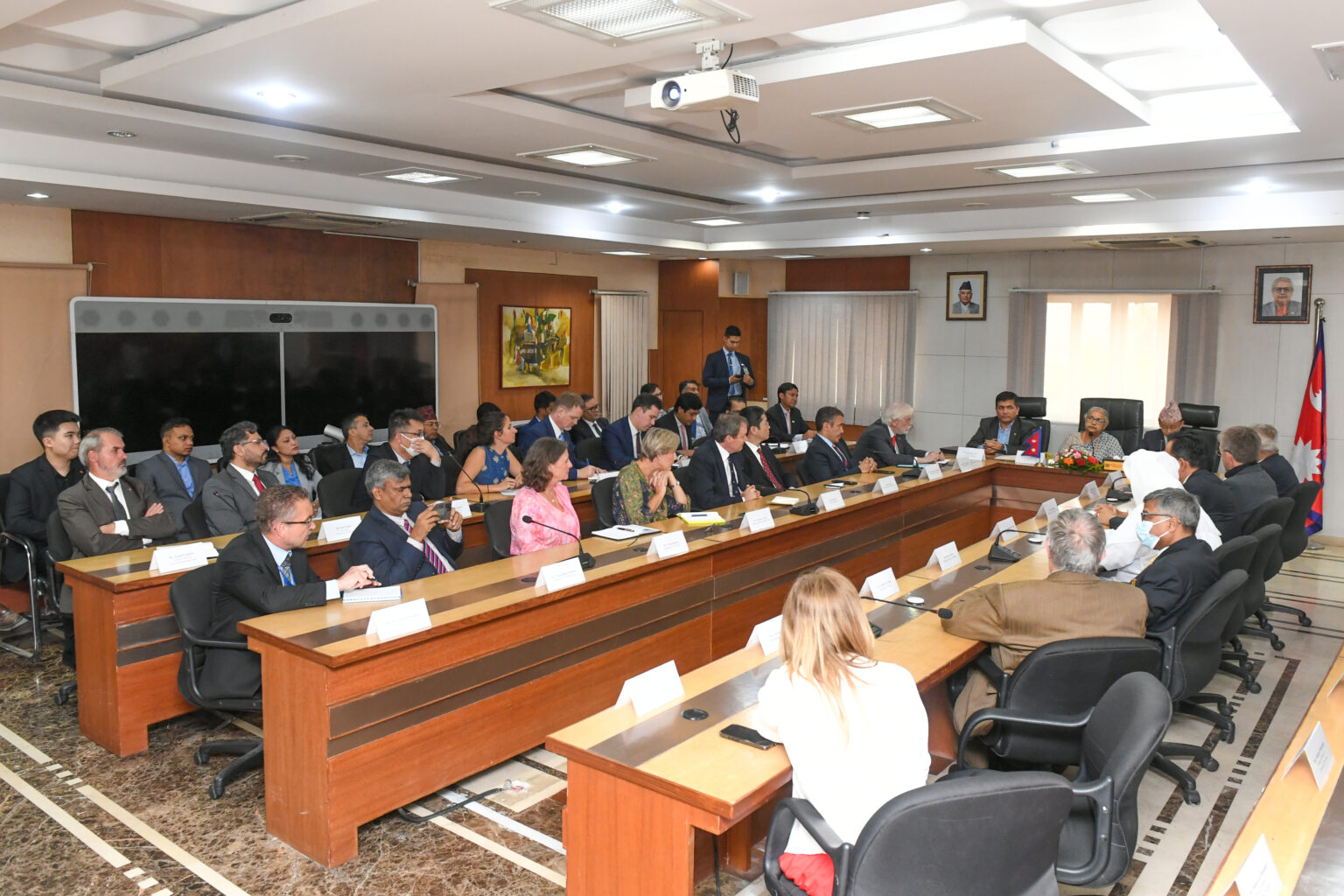
Prime Minister Karki, who is very busy with domestic politics, has not been able to give enough time to the country’s external relations and foreign affairs. The reason she has been unable to upgrade the country’s diplomacy and external relations in the new circumstances is that she holds seven ministries in addition to the declared responsibility of the Office of the Prime Minister and Council of Ministers. Prime Minister Karki is responsible for the Ministry of Defense, Ministry of Water Supply, Ministry of Labor, Employment and Social Security, Ministry of Women, Children and Senior Citizens, Ministry of Forest and Environment, and Ministry of Culture, Tourism and Civil Aviation, including Foreign Affairs. The strain of one person managing seven ministries has not allowed Karki to focus on the work of the MoFA.
Furthermore, additional burdens like preparation for the March 5, 2026, House of Representatives election and interactions with political parties and the Gen Z protest have meant the MoFA has not been her priority. However, the direct impact of this is being seen in the country’s international presence and diplomatic relations.
Diplomatic opportunity left unclaimed at the General Assembly
The country’s representation in some important international forums, where the Head of Government and Foreign Minister participate, has fallen to an embarrassing state. Let’s look at a recent example: Nepal did not have high-level representation at the 80th United Nations General Assembly (UNGA) that began in New York on October 9. In other years, the prime minister represented the country at the UNGA. Last year, a team including the then-Prime Minister KP Oli and Foreign Minister Arzu Rana went to New York. There, Oli held bilateral dialogues with top leaders of many countries, including Indian Prime Minister Narendra Modi and Chinese Foreign Minister Wang Yi.
This year, the UN platform, which saw the participation of more than 100 heads of government from around the world, also included influential foreign ministers, senior diplomats, and heads of donor agencies globally. That collective gathering of world leaders was an important opportunity for Nepal to explain the Gen Z protest, the subsequent developments, and the government’s priorities to the world. However, the country missed that significant opportunity. Diplomat and former Ambassador Professor Lok Raj Baral says, “When there is high-level representation at the UN General Assembly, it would have been easy to explain the country’s situation to the world, but the government was busy with internal politics, so that opportunity was lost.”

Not only was US President Donald Trump of the major power nation present at the UNGA, but a delegation led by Prime Minister Li Qiang from China, Nepal’s northern neighbor and another power nation directly clashing with the US, also participated. From the southern neighbor India, Foreign Minister S. Jaishankar went to New York. It was unfortunate that Nepal did not even have ministerial-level participation in such a strategically important forum. Lok Bahadur Thapa, the head of the Nepali Mission in New York, participated as the Nepali representative there. Former Ambassador Vijay Kant Karna says, “The reason for the absence of high-level representation at the UN General Assembly may be that this government’s priority is only the election.” The United Nations is the most important platform for Nepal’s global presence. Nepal is also the chair nation of the Least Developed Countries (LDC) group. As the chair nation, Nepal could have presented the changed scenario after the Gen Z protest and the nation’s priorities at the UN General Assembly. Similarly, the opportunity to appeal for international community support for the country’s economic development, human rights, climate change issues, and elections was also missed.
Low-key representation
Another international forum where the country missed the opportunity for high-level representation is the United Nations Climate Change Conference (COP30). While Heads of Government and State from India, China, and the US did not participate in the conference, which is ongoing in Belém, Brazil, from November 10 to 20, there was significant representation from Heads of Government and State of Brazil, the UK, Spain, France, Germany, Finland, Pakistan, and several Middle Eastern countries. Belém’s COP30 is an important platform to tell the world about the damage climate change has inflicted on Nepal.
In this gathering of the world’s major donor institutions, including the European Union, and officials and organizations active in climate change, representation by at least the Foreign or Forest Minister from Nepal would have been desirable. It would have been even better if the prime minister’s representation as the head of government had been ensured. Unfortunately, both the Forest and Foreign Minister chairs are vacant. As Prime Minister Karki has kept both ministries with herself, a new strategy was devised to show Nepal’s presence in Belém. Instead of the Forest and Foreign Minister, Minister of Agriculture and Livestock Development Madan Pariyar was sent there. According to a high-level source at the MoFA, ‘Agricultural Minister Pariyar was sent to Brazil because he is considered like the forest and close to the forest.’
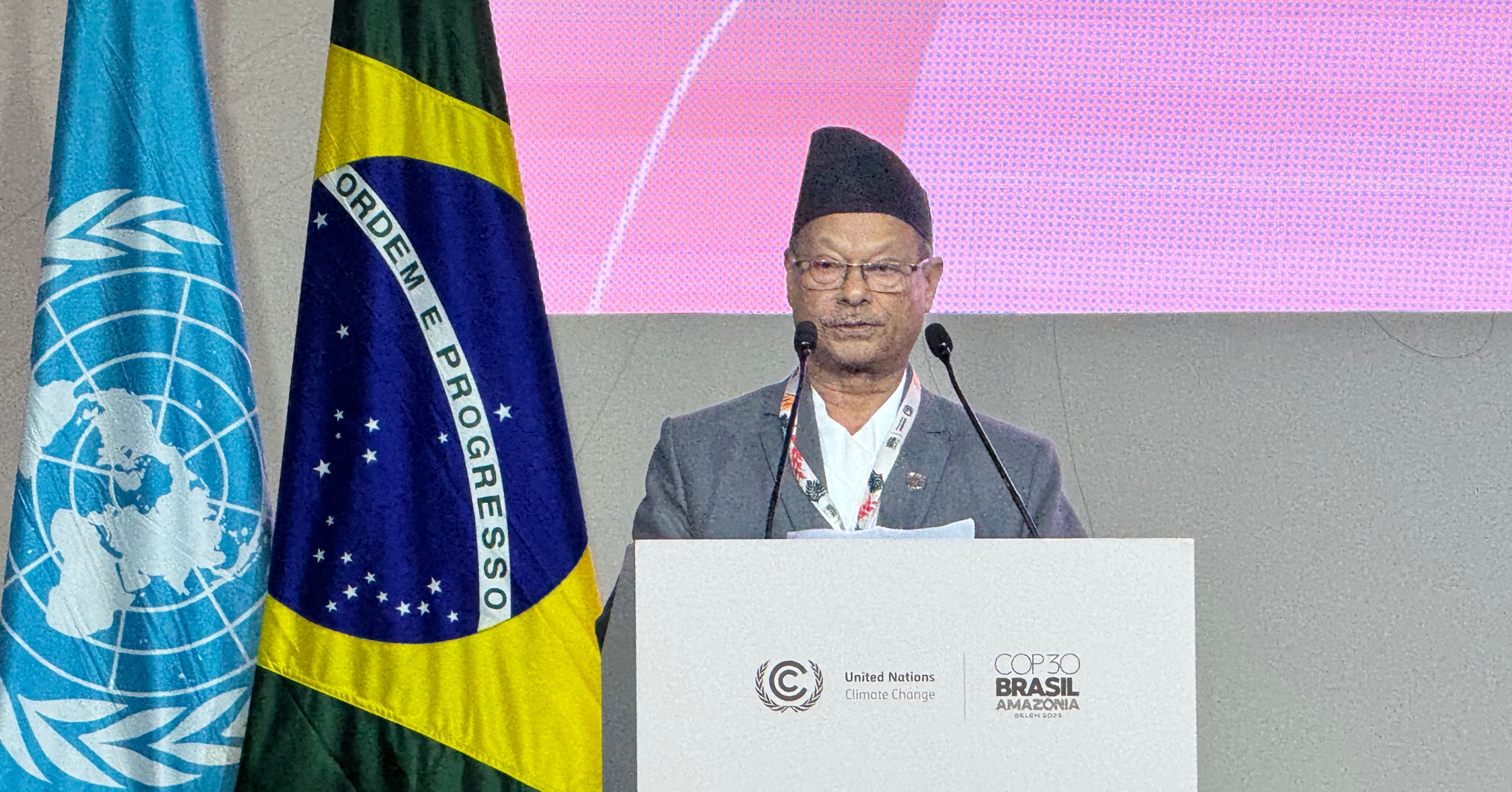
Also, the Second World Social Development Summit, held in Qatar from November 4 to 6, was another important international forum where the representation of the Foreign Minister was necessary after the Gen Z protest. However, there was no executive presence from Nepal there either. Instead of the prime minister or a minister, the government sent President Ram Chandra Paudel to the Qatar conference. The press note issued by the MoFA on November 6, after Paudel’s visit to Qatar states: “This visit of the Right Honorable President has helped to strengthen Nepal’s presence in international forums and raise the voice in favor of developing nations like Nepal.”
Owing to the prime minister’s own policy
The reason for the low-key presence on the world stage is Prime Minister Karki’s own policy. Since she has an electoral mandate, Karki has adopted a policy of not visiting any country before that. She will not be visiting the southern and northern neighbors immediately upon reaching Singha Durbar like previous prime ministers. According to Foreign Secretary Amrit Bahadur Rai, Prime Minister Karki has not yet received an invitation to visit any country.
Prime Minister Karki is not only rarely present in foreign forums but also rarely attends the ministries she manages due to her workload. Karki has only been present at the MoFA twice so far. Most recently, on October 17, she invited foreign ambassadors and heads of donor agencies stationed in Nepal to the ministry itself to explain the post-Gen Z protest situation and the government’s priorities. Before that, she first went there on October 8 to virtually address the heads of Nepali missions abroad.
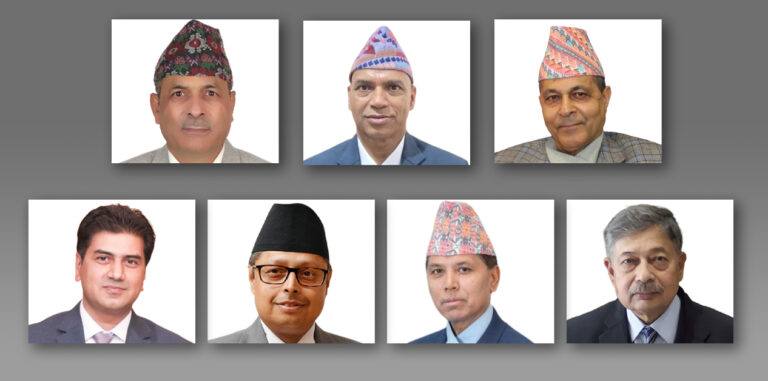
However, MoFA Spokesperson Lok Bahadur Paudel Chhetri says, “The fact that the Prime Minister herself is handling the Ministry of Foreign Affairs after the Gen Z protest makes it clear that this ministry is a priority for the current government. The Prime Minister certainly has pressure and workload. But not having a separate foreign minister has not created difficulties for us in our work.” Even though Chhetri defends Prime Minister Karki, Foreign Secretary Rai has to carry files and visit Prime Minister Karki either at Baluwatar or enter the Office of the Prime Minister and Council of Ministers in Singha Durbar to get important decisions made for the ministry. This is because Secretary Rai must meet the Prime Minister for decisions that the Foreign Minister must make.
At least 11 ambassadorial desks vacant, staffs holding the line
The changed scenario of the MoFA after the Gen Z protest is not limited to this. The interesting thing is that 10 of the 11 ambassadors recalled by the Karki-led Cabinet have returned to Nepal. On October 5, the Cabinet asked Nepali Ambassadors in power nations, excluding India, to return to Nepal on their old tickets by November 6. This caused a commotion in Nepali missions abroad. After a writ petition was filed against this in the Supreme Court, the Supreme Court issued an interim order on November 3 not to immediately implement the government’s decision to recall the ambassadors. Subsequently, the government directed the returned ambassadors to report to the MoFA.
Commenting on this contradiction, which is rare in the country’s diplomatic affairs, former Member of Parliament Deepak Prakash Bhatta, an expert on national security and foreign affairs, states that the country’s credibility in the global community is weakened when the opinion of the court and the executive differs on international relations.
Bhatta says, “The Karki-led interim government, which has an electoral mandate, should have activated the existing ambassadors to make foreign missions more effective in gaining the trust and support of the international community for the upcoming election, but recalling them for political reasons is a reverse step. Once recalled, either new ones should have been sent immediately, or the existing ones should not have been recalled. This will also make it difficult for the government to garner the trust and support of the global community for the election. This has created a large vacuum and uncertainty in the country’s international relations and diplomacy.”
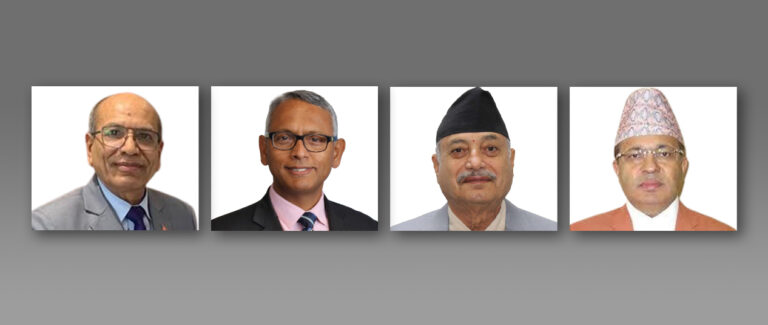
Of the ambassadors recalled by the government, 10 have returned to Nepal, except for the Nepali Ambassador to Russia, Jang Bahadur Chauhan. Among the 10, ambassadors to the US (Lok Darshan Regmi), the UK (Chandra Kumar Ghimire), China (Krishna Prasad Oli), and Qatar (Ramesh Chandra Paudel) have already resigned. The MoFA has stated that Prime Minister Karki has accepted their resignations.
Among the 7 who have not resigned, Jang Bahadur Chauhan, the Ambassador to Russia, is still there under the guise of medical treatment. The other 6, who are Sunil Nepal, Netra Prasad Timilsina, and Naresh Bikram Dhakal, are drawing a salary by reporting daily to the ‘Ambassador Room’ on the first floor of the MoFA. The ambassador to Israel, Dhan Prasad Pandit, is performing funeral rites for his mother, while the ambassadors to Japan, Durga Bahadur Subedi, and Germany, Shail Rupakheti, are on home leave. MoFA Spokesperson Chhetri says, “They are regularly coming to the ministry, and arrangements have been made for the ministry to utilize their expertise.”
The 11 countries from which the government recalled ambassadors have a large share of Nepal’s foreign trade, employment, and foreign investment. However, recalling ambassadors from these very countries directly affects foreign trade, investment, and employment with them. The government’s decision to recall ambassadors appointed by the previous government based on political sharing might be correct to some extent. However, recalling ambassadors, including those from power nations and countries of direct concern to Nepal, suddenly and simultaneously can cause long-term damage to the country. Senior diplomat and former Ambassador Nilambar Acharya adds, “The effect of this will be seen in the long run.”
In the 11 countries that were recalled, the government has assigned the responsibility of acting as ambassadors to people ranging from branch officers to joint secretaries. The most surprising fact is seen in Nepal’s two major neighbors, India and China. The government retained Ambassador to India, Shankar Sharma, but recalled Ambassador to China, Krishna Prasad Oli.
It should be remembered that Oli was appointed ambassador under the CPN (UML) quota, and Sharma under the Nepali Congress quota. Senior diplomat Acharya comments that the decision to retain the Nepali Ambassador to India while recalling those from the US, the UK, and China is absurd and arbitrary. He says, “The act of keeping an ambassador in one country and leaving a vacancy in another is very bad, and the message sent by withdrawing ambassadors from power nations is even worse.”
Indeed, leaving ambassador posts vacant in major power nations after the Gen Z protest can have a long-term impact. Recalling ambassadors and putting staff in charge at a time when the changed situation needs to be explained is not considered diplomatic maturity. Among the countries where ambassadors were recalled, the government has given the assigned acting charges to Roshan Khanal (Joint Secretary) in China, Sharad Raj Aran (Joint Secretary) in the US, Bipin Duwadi (Under Secretary) in the UK, Harihar Kant Paudel (Under Secretary) in Japan, Kumar Raj Rai (Under Secretary) in Qatar, Sagar Phuyal (Under Secretary) in Germany, Srijana Adhikari (Under Secretary) in Saudi Arabia, Madita Bajracharya (Under Secretary) in Malaysia, and Purak Adhikari (Section Officer) in Spain. In Israel and Russia, which have vacant ambassadorships, no acting ambassador has been appointed yet.
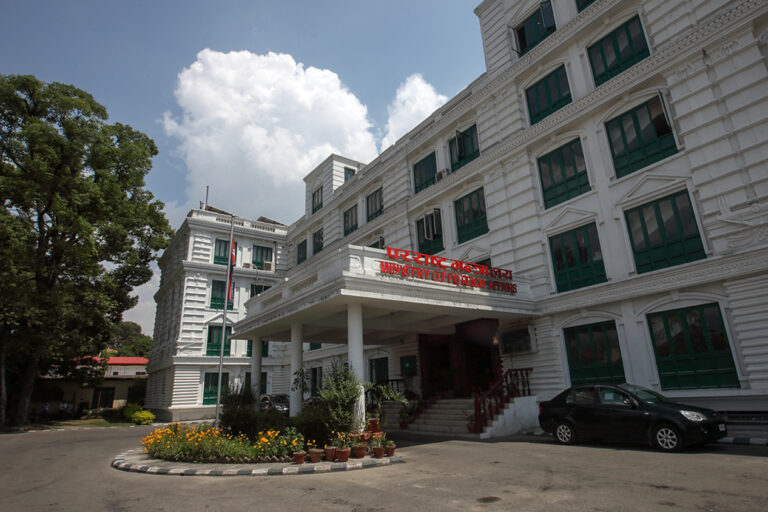
There is also no uniformity in the decision to recall ambassadors. No clear reason has been given for retaining some while recalling others. For instance, Shankar Sharma in India, Chitralekha Yadav in Australia, Sumnima Tuladhar in Denmark, Shiv Maya Tumbahamphe in South Korea, Purna Bahadur Nepali in Sri Lanka, and Kapil Shrestha in South Africa have been retained. Yet, these ambassadors were also appointed based on political sharing. Sharma, Yadav, and Shrestha were selected from the Nepali Congress quota, and Tuladhar and Tumbahamphe from the CPN (UML) quota.
Career diplomats appointed without political sharing in Pakistan, France, Bangladesh, and other countries have been retained. Note that among the countries where ambassadors have been retained, Nepal’s foreign trade and employment are not particularly encouraging, except with India. However, it does not seem logical to retain ambassadors in countries of lesser justification and necessity while recalling ambassadors from diplomatically and strategically important countries.
Former Ambassador Professor Lok Raj Baral says that it was unnecessary for an interim government with an electoral mandate and a short term to arbitrarily recall and retain ambassadors in this manner. He says, “Ambassadors were recalled from essential countries and retained in places where they were not needed or could have been absent. That was not good.”
It has been more than two months since the MoFA has been without a full-time minister and almost one month since 11 countries have been without ambassadors. The absence of a minister and ambassadors has left the MoFA operating on an ad hoc basis. This could have a far-reaching impact on international relations, which will be evident in the future.